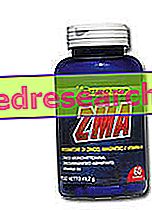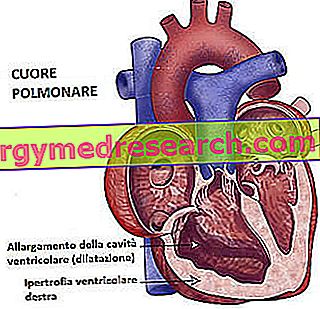
Information on ZMA - EUROSUP
ZMA - EUROSUP
Food supplement based on zinc, magnesium and vitamin B6
FORMAT
Pack of 60 capsules
COMPOSITION
Zinc monomethionine
Zinc / Magnesium aspartate
Vitamin B6
Capsule: Gelatin
Stabilizer: microcrystalline cellulose
Anti-caking agents: silicon dioxide
Per capsule: Zinc 7.5 mg - Magnesium 112.5 mg - Vitamin B6 2.62mg
Product features ZMA - EUROSUP
ZMA - is a product, based on zinc and magnesium enriched with vitamin B6. Unlike other trace element supplements, this product has a patented formulation, which covalently associates zinc / monomethionine with zinc / magnesium aspartate and vitamin B6. The above forms represent the formulations best absorbed by the human intestine.
Zinc: an essential trace element, as it also traces in the safeguarding of the correct cellular functionality, returning to numerous reactions such as:
- Cofactor of different enzymatic classes;
- Structural factor that guarantees the functionality of transcription factors, antioxidant enzymes and membrane structural proteins;
- Regulator of gene transcription, cell cycle, intracellular signaling and hormonal function.

Magnesium: trace element present for about 25 grams in the human body and concentrated mainly in the skeleton (60%) and in the muscle (27%). It is part of different cellular reactions (more than 300), three of which:
- Energy production: magnesium is a cofactor of numerous enzymes involved in glucose metabolism and in ATP synthesis;
- Anabolic reactions: participates in the synthesis of the most important macromolecules of our organism;
- Structural role: it is part of the formation of cell membranes and bone tissue;
- Regulation of cellular functionality: involved in both cell-singalling and cell migration.

Vitamin B6: a group of water-soluble vitamins that includes pyridoxal, pyridoxine and pyridosamine. The coenzymatic form expressed in humans is a phosphorylated ester known as pyridoxalphosphate, which is obtained following absorption of vitamin B6 at the duodenal level, plasma transport, hepatic modification and storage at tissue level. Vitamin B6 is part of numerous reactions, among which we can mention:
- Glucose metabolism: gluconeogenesis and glycogenolysis;
- Neurotransmitter synthesis: is part of the synthesis of serotonin;
- Maintenance of erythrocyte function: coenzyme is included in the EME group synthesis;
- Control of hormonal activity;
- Synthesis of nucleic acids.
LARNs suggest the daily intake of 1.1 mg of vitamin B6 for women and 1.5 mg for men, which can be easily satisfied with a balanced diet containing products of animal origin.
Rationale for use - ZMA - EUROSUP
This product was born as an endogenous stimulator of anabolic metabolism, but doubts about its effectiveness are many. We are talking about a study conducted by prof. Shines in those of Washington, in which supplementation with 30 mg of zinc monomethionine / aspartate, 450 mg of magnesium / aspartate and 10.5 mg of vitamin B6 for 8 weeks, before bedtime, would have increased total and free testosterone levels by more than 30% of IGF-1 (an important messenger with anabolic function) of 3.6% and improved athletic performance. However, the aforementioned study, not only is not published on the largest worldwide database, but has been punctually denied by two subsequent studies, in which there was no increase in testosterone and IGF1 levels, nor any improvement in athletic performance or composition body.
The scientific literature, on the other hand, seems to agree on the effect of trace elements, and especially magnesium, in sustaining and improving athletic performance both from a metabolic and hormonal point of view.
Recommended use by the company - ZMA - EUROSUP
Swallow one serving (1 capsule) a day, 30-60 minutes before bedtime, with water or other liquid of your choice
Use in sports - ZMA - EUROSUP
There are currently no studies showing an effective dosage for this supplement.
If you wanted to replicate the doses used in the only study that shows positive effects on testosterone levels you should take 4 capsules per day, preferably on an empty stomach.
In this case, however, diarrheal episodes or abdominal pains cannot be completely excluded.
Zinc: the most effective dose appears to be 3 mg / kg;
Magnesium: the most studied and effective dose appears to be 10 mg / kg;
Side effects ZMA - EUROSUP
Zinc: high amounts of zinc introduced are responsible for abdominal pain, diarrhea, nausea and vomiting. Chronic zinc administration (60 mg / day total) is associated with copper deficiency.
Magnesium: high amounts of magnesium are responsible for profuse diarrhea. The increase in serum magnesium levels is instead associated with hypotension, confusion, heart rhythm disorders, deterioration of renal function, fatigue, difficulty in breathing, and even cardiac arrest. The dose of safe supplementation appears to be 350 mg / day.
Vitamin B6: chronic administration can be responsible for damage to the nervous system and neuropathies of various levels already at doses higher than 200mg / day.
Interactions ZMA - EUROSUP
Zinc: in addition to interfering with other trace elements such as copper, it could reduce the absorption of some antibiotics such as tetracyclines, reducing their effectiveness.
Magnesium: may interfere with some antibiotics, tranquilizers and oral anticoagulants, reducing their effectiveness.
Precautions for use ZMA - EUROSUP
The product is contraindicated in cases of renal or hepatic disease, cardiovascular disease and / or hypertension, during pregnancy, during lactation and under 14 years.
This article, elaborated on the critical re-reading of scientific articles, university texts and common practice, is for informational purposes only and is therefore not a medical prescription. It is therefore always necessary to consult your doctor, nutritionist or pharmacist before starting to use any kind of supplement . Further information on the critical analysis of ZMA - EUROSUP.
| BIBLIOGRAPHY |
Serum testosterone and urinary excretion of steroid hormone metabolites after administration of a high-dose zinc supplement. Koehler K, Parr MK, Geyer H, Mester J, Schänzer W. Eur J Clin Nutr. 2009 Jan; 63 (1): 65-70. Epub 2007 Sep 19. Effects of Zinc Magnesium Aspartate (ZMA) Supplementation on Training Adaptations and Markers of Anabolism and Catabolism. Wilborn CD, Kerksick CM, Campbell BI, Taylor LW, Marcello BM, Rasmussen CJ, Greenwood MC, Almada A, Kreider RB. J Int Soc Sports Nutr. 2004 Dec 31; 1 (2): 12-20 Effect of fatiguing bicycle on thyroid hormone and testosterone levels in sedentary males supplemented with oral zinc. Kilic M. Neuro Endocrinol Lett. 2007 Oct; 28 (5): 681-5. The effect of exhaustion on thyroid hormones and testosterone levels of elite athletes receiving oral zinc. Kilic M, Baltaci AK, Gunay M, Gökbel H, Okudan N, Cicioglu I. Neuro Endocrinol Lett. 2006 Feb-Apr; 27 (1-2): 247-52. Zinc supplementation in rats subjected to acute swimming exercise: Its effect on testosterone levels and relation with lactate. Kaya O, Gokdemir K, Kilic M, Baltaci AK. Neuro Endocrinol Lett. 2006 Feb-Apr; 27 (1-2): 267-70. Neuroendocrine responses to running in women after zinc and vitamin E supplementation. Singh A, Papanicolaou DA, Lawrence LL, Howell EA, Chrousos GP, Deuster PA. Vitamin and mineral status of trained athletes including the effects of supplementation. Weight LM, Noakes TD, Labadarios D, Graves J, Jacobs P, Berman PA. Am J Clin Nutr. 1988 Feb; 47 (2): 186-91. Effects of Magnesium Supplementation on Testosterone Levels of Athletes and Sedentary Subjects at Rest and after Exhaustion. Cinar V, Polat Y, Baltaci AK, Mogulkoc R. Biol Trace Elem Res. 2010 Mar 30. [Epub ahead of print] .The effects of magnesium supplementation on thyroid hormones of sedentars and Tae-Kwon-Do sportsperson at resting and exhaustion. Cinar V. Neuro Endocrinol Lett. 2007 Oct; 28 (5): 708-12. Update on the relationship between magnesium and exercise. Nielsen FH, Lukaski HC. Magnes Res. 2006 Sep; 19 (3): 180-9. Review. Magnesium sulfate enhances exercise performance and manipulates dynamic changes in peripheral glucose utilization. Cheng SM, Yang LL, Chen SH, Hsu MH, Chen IJ, Cheng FC. Eur J Appl Physiol. 2010 Jan; 108 (2): 363-9. Epub 2009 Oct 9. Magnesium sulfate enhances exercise performance and manipulates dynamic changes in peripheral glucose utilization. Cheng SM, Yang LL, Chen SH, Hsu MH, Chen IJ, Cheng FC. Eur J Appl Physiol. 2010 Jan; 108 (2): 363-9. Epub 2009 Oct 9. The effect of magnesium supplementation on the levels of sportsmen and sedanter. Cinar V, Nizamlioğlu M, Moğulkoc R. Acta Physiol Hung. 2006 Jun; 93 (2-3): 137-44. |



